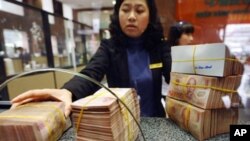Vietnam recently devalued its currency, the dong, by 9.3 percent against the dollar. Analysts say soaring inflation here makes life harder for many Vietnamese workers.
Consumer prices in Vietnam this January were more than 12 percent higher than they were a year ago, reflecting rising costs of food, fuel and household goods.
High inflation is putting pressure on workers.
Nguyen Huy Thinh drives a bus in downtown Hanoi. He says he has trouble getting by on his $250 monthly salary. He says that while prices for gasoline and electricity are increasing, his salary stays the same. That makes it hard to support his family.
Despite a decade of strong growth, Vietnam had a $12.4 billion trade deficit last year, and inflation surpassed 11 percent for the year, despite the government’s attempt to limit it to 8 percent.
To contain inflation and cut the trade deficit, Vietnam devalued its currency, the dong, by 9.3 percent against the dollar earlier this month. The devaluation was the fourth since 2009.
Both Moody's Investors Service and Standard & Poor's downgraded Vietnam’s sovereign debt rating in December after state-owned shipbuilding conglomerate Vinashin defaulted on payment for a $600 million.
Having a lower rating makes it harder for Vietnam to borrow money abroad.
Adam McCarty is the chief economist for the consulting firm Mekong Economics, in Vietnam. He says the economy is not in crisis, but inflation is taking a toll on average workers.
"Normally poorer-than-average people on salaries or pensions are the ones who lose when inflation is high, and then more broadly, the pace of generating new jobs slows down somewhat if the economy’s got trouble," McCarty said.
McCarty said inflation also makes it harder for middle-class Vietnamese to buy property.
Some financial market analysts praise Vietnam for devaluing the dong, saying the new value better reflects prices on the black market, where traders exchange dong for gold and dollars. But other economists have warned that the government may need to do more to cap inflation and protect the economy.
Inflation Squeezes Vietnamese Workers




